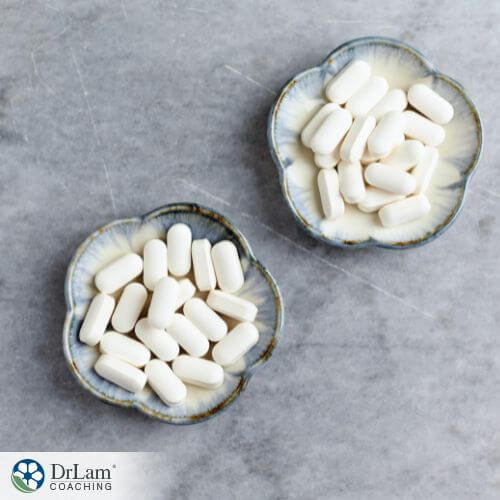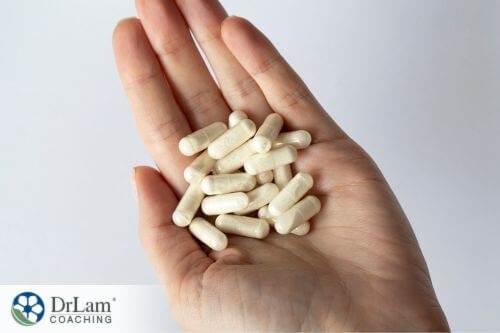 Many have heard of GABA, but few understand the full scope of its functions. GABA is the chief inhibitory neurotransmitter in the body, responsible for modulating several bodily functions, especially those relating to mental health. Unsurprisingly, therefore, GABA imbalances can have serious implications. One of the emerging strategies for managing these imbalances is GABA supplements. However, there are questions on the safety and efficacy of these supplements. This article addresses them and other related issues.
Many have heard of GABA, but few understand the full scope of its functions. GABA is the chief inhibitory neurotransmitter in the body, responsible for modulating several bodily functions, especially those relating to mental health. Unsurprisingly, therefore, GABA imbalances can have serious implications. One of the emerging strategies for managing these imbalances is GABA supplements. However, there are questions on the safety and efficacy of these supplements. This article addresses them and other related issues.
There are over 40 neurotransmitters in the body, and they are broadly classified into two groups depending on whether they increase or decrease nervous system activity. Excitatory neurotransmitters promote the generation of an action potential, increasing nervous system activity. In contrast, inhibitory neurotransmitters block or prevent the generation of an action potential, decreasing nervous system activity.
Gamma-aminobutyric acid (GABA) is an amino acid that functions as the chief inhibitory neurotransmitter in the body. It works by hyperpolarizing the cell, which inhibits the transmission of an action potential. Other inhibitory neurotransmitters in the body include serotonin, dopamine, and glycine.
GABA is synthesized from glutamate (the chief excitatory neurotransmitter) in an irreversible α-decarboxylation reaction. This reaction is catalyzed via glutamate decarboxylase, which uses vitamin B6 as a cofactor. This process occurs in the cytoplasm of the presynaptic neuron after which the synthesized GABA is stored in the synaptic vesicle of the neuron. Outside of the nervous system, GABA can also be synthesized in the beta cells of the pancreas.
The inhibitory activity of GABA in the nervous system promotes calming effects, correlating to increased relaxation, calmer mood, and regulated sleep. However, while the primary role of GABA is to block the transmission of action potential, thereby reducing nervous system activity, its specific role depends on the neural circuit it is inhibiting.
Therefore, an imbalance of GABA in the nervous system can cause a variety of mental health conditions, including anxiety disorders, schizophrenia, autism spectrum disorder, and depression.
GABA is particularly important if you’re stressed. The body has many regulatory pathways that respond to stressful triggers. One of these responses is the activation of the sympathetic nervous system (SNS). The SNS is a part of the autonomic nervous system, which controls your “fight or flight” response as well as the “rest and digest” response, in appropriate situations. The “rest and digest” response is coordinated by the parasympathetic nervous system.
The “fight or flight” response was beneficial evolutionarily because it stimulated the body so it could respond effectively to danger. It does this using the neurotransmitters epinephrine and norepinephrine. These control the stress response, increasing your heart rate and breathing rate, and activating systems that make energy available for you to escape or fight off a threat.
Activation of the sympathetic nervous system leaves you feeling anxiety, fear, restlessness, and the inability to fall asleep because of racing thoughts and “what ifs”. When active and functioning correctly, GABA is then released to deactivate or inhibit these effects, promoting calmness and relaxation.
Some signs that you might have low GABA levels include:
 Depression
DepressionGABA deficiencies aren’t well understood, but there are several important benefits of ensuring that your levels are adequate. These include:
GABA increases slow-wave sleep by reducing the firing rate of neurons found in the posterior hypothalamus. By doing so, it enables deeper sleep. This effect also helps GABA rebalance the biological rhythm and sleep-wake cycle. Studies have found that GABA levels can be up to 30 percent lower in insomniacs.
GABA may help lower blood pressure by calming the excitation of the nervous system and promoting feelings of calm and relaxation. It may also help alleviate sleeping disorders, which can also increase your blood pressure. This makes GABA an effective and natural high-blood pressure remedy.
According to a small study, GABA supplementation may enhance your ability to plan and prioritize, enhancing your thinking. It may also help alleviate fatigue, which will further boost your cognitive abilities.
A single study has shown that GABA may help to build muscle and assist with workout recovery. More research is needed on this benefit.
The best way to test GABA levels is through a urine neurotransmitter test. This test simply involves submitting a urine sample to a specialized laboratory, which then evaluates the sample for neurotransmitter levels.
Neurotransmitters are present in various biological fluids throughout the body, including urine, saliva, blood, and cerebrospinal fluid. Of these fluids, the cerebrospinal fluid contains the greatest amount of GABA. However, urine is the preferred testing sample because, unlike cerebrospinal fluid, it can be collected through noninvasive means. Urine testing is also preferred to blood testing because neurotransmitter levels in the blood are typically very low and thus unreliable for testing.
The body is constantly exposed to stress, and studies indicate that day-to-day stress has increased over the years.7 This is perhaps unsurprising, considering the increase in environmental pollution with the popularity of automobiles and other fuel-consuming activities. Still, the body is well-equipped to manage acute stress through the NeuroEndoMetabolic (NEM) Stress Response, which is the body’s natural stress-coping mechanism.
The NEM system consists of six circuits, comprising different organs of the body, all working together to reduce stress and maintain homeostasis. However, while the NEM does a good job of managing acute stress, in the face of chronic stress, one or more of these circuits may dysregulate.
In particular, a dysregulation of the Neuroaffect circuit, which activates the release of inhibitory neurotransmitters, can induce different neurological symptoms. This is evident in multiple studies that link chronic stress to depression, insomnia, and anxiety disorders, all conditions GABA impacts. While the exact relationship between stress and GABA is not fully known, research indicates that stress may reduce the GABAergic interneuronal network and promote the development of neuropsychiatric conditions.
Aside from the GABA-related mental conditions that may arise from the dysregulation of the NEM, other serious conditions like Adrenal Fatigue Syndrome (AFS) may arise. Adrenal fatigue is a non-Addison’s type of adrenal dysfunction in which the body’s stress response cannot keep up with the chronic stressors in life. This condition also has some neurological symptoms, like depression, brain fog, and dizziness.
The body produces GABA naturally, but in instances of GABA deficiencies, some medications can help mimic the action of GABA. They are as follows:
 Barbiturates, including phenobarbital, primodone, and thiopental.
Barbiturates, including phenobarbital, primodone, and thiopental.Alcohol and some other chemical substances can also modulate GABA signaling. However, alcohol is not recommended for modulating GABA signaling because it can affect the production of GABA and cause several short- and long-term physical and mental adverse effects.
There are several non-prescription GABA dietary supplements today, usually in capsule and pill form. These supplements are marketed as being able to increase GABA levels in the body. These supplements are produced from the fermentation of certain types of lactic acid bacteria.
It is not uncommon for manufacturers to include other hormones, like melatonin, in their GABA supplement products. The main marketing points of GABA supplements are as stress-relievers and sleep inducers (especially in combination with melatonin).
The effectiveness of GABA supplements hinges on its ability to cross the blood-brain barrier (BBB). The BBB is a semi-permeable membrane in the blood vessels of the brain that regulates the passage of molecules into the brain. This cellular barrier assumes the protective duties of limiting the effects of drugs and bacteria in the blood on the brain.
For a long time, between the 1950s and ‘80s, researchers believed that GABA could not cross the BBB, and this belief rendered orally administered GABA supplements practically useless. However, in the late 1980s, other researchers found that GABA could indeed cross the BBB, but in minute quantities. Further research in the early 2000s revealed that significant amounts of GABA may be able to cross the BBB due to the discovery of GABA-transporter systems in the brain.
Additionally, some researchers argue that GABA supplements may impact the brain and peripheral nervous system through the action of the enteric nervous system (ENS). The ENS is the independent nervous system that governs the activities of the gastrointestinal tract. Since GABA is also produced peripherally and is present in the ENS, it is argued that it can also affect the brain through the gut-brain axis.
Right now, there is no conclusive scientific evidence that GABA crosses the BBB. Therefore, medical practitioners are still unsure about the effectiveness of GABA supplements. Nonetheless, emerging studies are promising, with a reduction in stress levels and an improvement in cognitive skills among the effects individuals experience from taking GABA supplements.
The FDA has much less stringent regulations for supplements compared to prescription medications. This can result in a lot of supplements on pharmacy shelves whose safety and efficacy have not been proven. This also applies to GABA supplements.
Considering that many researchers dispute the ability of GABA to cross the blood-brain barrier, it becomes crucial to use only the best supplements. That said, below is one of the best GABA supplements you can use.
This supplement contains GABA and vitamin B6. The GABA content in GABAX helps improve the overall levels of GABA in the body, potentially offsetting the negative effects of a GABA deficiency. Also, GABAX contains vitamin B6, which is the cofactor of glutamate decarboxylase, the enzyme responsible for the synthesis of GABA in the nervous system.
In combination, GABA and vitamin B6, as present in GABAX, can help improve mood and promote a calming effect in the body. This supplement also helps relieve stress, which can cause several health conditions.
 Research on GABA supplements is limited, but the results of the available clinical studies show little to no adverse effects. However, people on alcohol or other GABA-modulating medications should be careful with these supplements as they may potentiate the side effects of the GABA medications. Such side effects include headache, sleepiness, burning in the throat, gastrointestinal disturbances, and respiratory depression.
Research on GABA supplements is limited, but the results of the available clinical studies show little to no adverse effects. However, people on alcohol or other GABA-modulating medications should be careful with these supplements as they may potentiate the side effects of the GABA medications. Such side effects include headache, sleepiness, burning in the throat, gastrointestinal disturbances, and respiratory depression.
Another consequence of the limited research is the lack of an effective dose of the supplement. For clinical studies, doses depend on the function being monitored, ranging from 120 to 300mg for stress and sleep, respectively. Still, daily doses of up to 1g may be effective and safe. Talk to your healthcare provider for more information.
Furthermore, pregnant women should stay away from GABA supplements due to the lack of adequate clinical research.
If you have issues with your mood, speak to your healthcare provider before taking GABA supplements.
Aside from GABA supplements, there are other ways to increase GABA levels naturally. Below are some of the best:
Consuming foods that contain GABA building blocks and vitamin B6 can help increase GABA levels in the body. Foods that contain GABA building blocks include berries, tomatoes, lentils, and potatoes. Similarly, foods that contain vitamin B6 include bananas, sprouts, salmon, avocados, and garlic.
Moreover, some fermented foods contain some amounts of GABA. Some of these foods are kimchi, miso, kefir, sauerkraut, and tempeh. The reasoning behind eating these foods is that beneficial bacteria in the gut can assist in GABA synthesis, and due to the gut-brain axis, this may enter the brain. This also explains why probiotics are useful, as they can increase the amount of healthy bacteria in the gut.
Along with making additions to your diet, it is also important to cut some food types and practices from your diet to naturally increase GABA. Alcohol automatically rises to the top of the list due to the adverse effects it can have on GABA production. You should also limit your caffeine intake and reduce smoking.
Practices and techniques that aid relaxation, like yoga, meditation, and breathing exercises, can help calm the body. This activates the parasympathetic nervous system, which is the predominant system at rest, accompanied by a natural increase in GABA levels. These relaxation practices also help relieve stress and anxiety, which also prevent conditions that arise from GABA imbalances.
Consistent and vigorous exercise can help increase the levels of GABA in the body. Also, exercise can help in the management of anxiety, stress, and sleep-related issues. Ultimately, exercise helps in calming the body, which indirectly impacts the natural production of GABA and keeps it in an optimal range.
GABA is the chief inhibitory neurotransmitter in the body, produced from glutamate, with glutamate decarboxylase as catalyst. This neurotransmitter promotes a calmer mood and can help regulate sleep.
GABA supplements are marketed as capable of increasing GABA levels in the body, consequently managing conditions that may arise from GABA imbalances. Although there are varying arguments about the supplements’ effectiveness, recent research shows encouraging results. Regardless, as with any other supplement, ensure you talk to your healthcare provider before using GABA supplements. Making dietary changes, exercise, and relaxation practices may also increase GABA levels.
If you’re worried about getting enough GABA or think you might be deficient, then call +1 (626) 571-1234 to talk to the team or click here to use the Ask The Doctor System.
Hou, X., Rong, C., Wang, F., Liu, X., Sun, Y., Zhang, H.T. "Gabaergic System in Stress: Implications of Gabaergic Neuron Subpopulations and the Gut-Vagus-Brain Pathway." Neural Plasticity, 2020, Article ID 8858415. doi:10.1155/2020/8858415.
Jie, F., Yin, G., Yang, W., Yang, M., Gao, S., Lv, J., Li, B. "Stress in Regulation of GABA Amygdala System and Relevance to Neuropsychiatric Diseases." Frontiers in Neuroscience, vol. 12, 14 Aug. 2018, Article 562. doi: 10.3389/fnins.2018.00562.
Hepsomali, P., Groeger, J.A., Nishihira, J., Scholey, A. "Effects of Oral Gamma-Aminobutyric Acid (GABA) Administration on Stress and Sleep in Humans: A Systematic Review." Frontiers in Neuroscience, vol. 14, 17 Sep. 2020, Article 923. doi: 10.3389/fnins.2020.00923. PMID: 33041752.
There are no significant adverse effects to taking GABA supplements, both in the short- and long-term. While there have been a lot of different opinions on the efficacy of GABA supplements, there is no such controversy on their safety. Pregnant women and those on other GABA medications may be at a higher risk, though.
